Please note that this guidance does not constitute legal advice. Businesses are encouraged to refer directly to the legislation and seek independent legal advice to ensure compliance.
Do you sell knives, box-cutters, daggers, axes, tomahawks, machetes, sickles, scythes, swords, spears, spear guns or gel blasters?
In January 2025, the National Retail Association held a free online information session recapping current knife laws and best practice advice.
Non-member queries about knife laws in any state should be directed to PoliceLink 131 444.
Members can contact the NRA Policy team for assistance.
There are new laws in Queensland from 1 September 2024
which mean that knives and other items are considered controlled items.
Sellers must ensure knives and other controlled items are not sold to minors under 18 years and this will require age checks, staff instruction, in-store signage, and advertising restrictions. Some knives, such as those made from plastic or with a rounded end, are exempt.
Particular controlled items, such as axes, machetes, and swords, cannot be sold to minors but must also be securely stored prior to sale, such as in locked cabinets or tethered so they cannot be removed without staff assistance. Restricted items, such as gel blasters which could be mistaken for real firearms, cannot be sold to minors, must be securely stored, and have additional obligations for both sellers and buyers.
Click on each tab below to understand the legal requirements for sellers or download the full Guide for Sellers.
To understand your responsibilities, review your range and determine whether an item is:
If unsure, the National Retail Association recommends a risk-averse approach which focuses on the intent of the legislation which is to prevent potentially harmful items from ending up in the wrong hands.
We recommend that businesses should not rely on how the product is named or labelled, and should also check for controlled items, such as box-cutters, in multi-item or toolbox kits.
Consider how an average person (not a specialist or tradesperson) would classify the item, whether it poses danger in the hands of minors or if it was used in a crime, and what is the risk of breaching the law if you classify it incorrectly.
For example, an item may be labelled as a hatchet but most people would still consider this a form of axe, therefore it may be best to treat this as an axe and apply secure storage requirements.
Click to expand in new tab
EXEMPT
CONTROLLED
Knives with one single-sided blade, such as:
CONTROLLED-SECURED
A specific list of items are identified:
RESTRICTED
Replica weapons under the Weapons Act 1990. Example:
Note: please see Weapons Act 1990 for extensive list of items considered weapons or restricted items.
Some businesses need to sell knives, axes, machetes, and other controlled items.
However, if these items are not a core product line and you don’t have a clear reason for selling them, consider removing them from your range.
If you continue selling these items, you will need to comply with all of the legal requirements, such as ID-checking processes, staff training, displaying signage, changing promotional materials, and you may need to install locked cabinets, cages or tethering devices which could entail significant expense.
If you no longer sell these items, you can reduce:
For example, some homewares, variety and convenience stores offer a few knives or a impacted tools as a small part of their range, and are making the decision to no longer sell these items as the cost, danger and complexity of offering them outweighs their minimal sales.
Other businesses are choosing to remove controlled items from their online store as setting up strong ID checking processes or software, as well as changing all combat-style promotional materials and packaging, is not worth the investment or risk.
Even members of the public who sell secondhand controlled items through online platforms, local markets or events must comply with the law.
If you don’t need to sell controlled items, or if you have concerns about complying with the new legal requirements, consider phasing out these items immediately.
Across Australia, crimes involving knives and other controlled items pose a serious risk to the community with increased offences reported, especially in crimes committed by minors.
By prohibiting the sale of specific items to minors, we can reduce their accessibility to young people, disrupt and deter violent offences, support responsible retailing, and improve community safety.
Legal requirements for sellers:
Penalty for sellers failing to meet these requirements: up to 420 penalty units. Employees who sell to minors face penalties up to 40 penalty units.
Legal requirements for customers:
Penalty for a person failing to meet these requirements: maximum 25 penalty units.
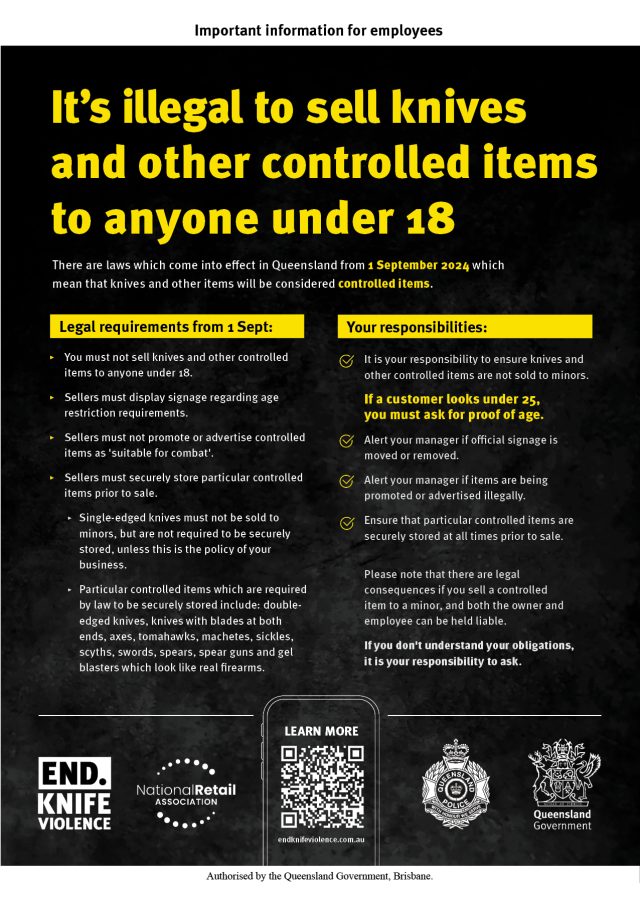
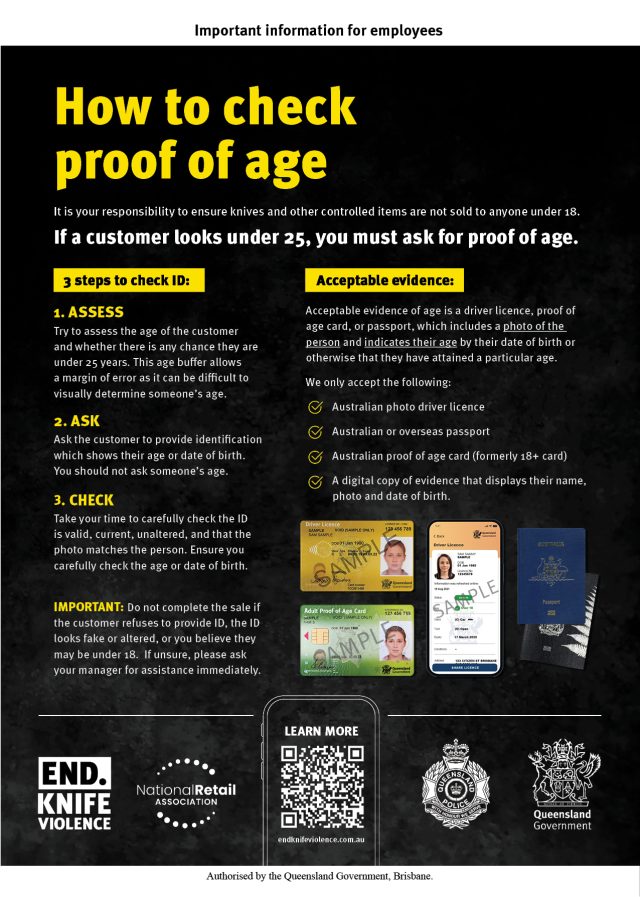
National Retail has developed posters for businesses to display in staff rooms or behind counters to remind staff of their obligations and how to check ID.
Scroll down or click here for resources.
To promote awareness of the new offences, reflect the seriousness of selling controlled items to minors and to reinforce compliance, sellers are required to display signage publicising the prohibition in all retail outlets where these items are sold.
Legal requirements for sellers:
Penalty for sellers failing to meet these requirements: maximum 20 penalty units.
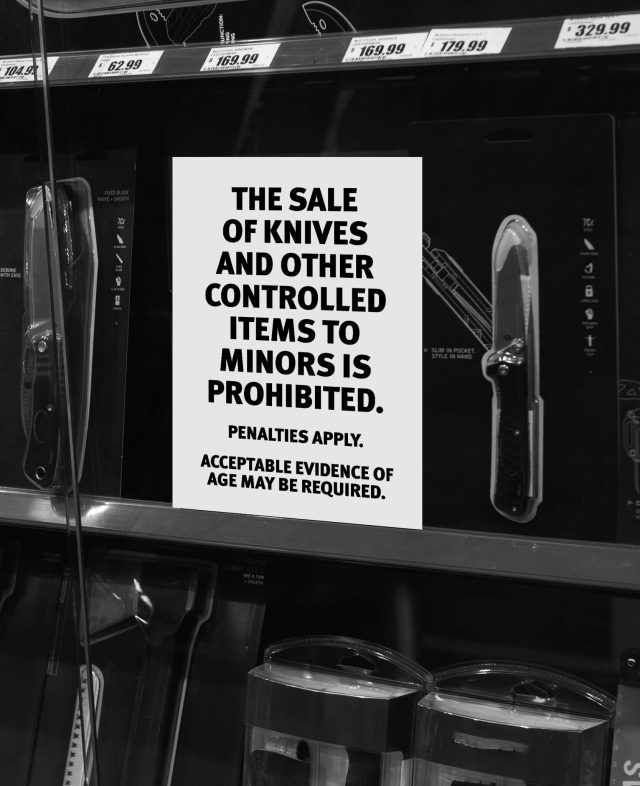
Similar to other regulated items, such as spray paint, there will be specific wording, size and colour requirements for signage.
While regulations are yet to be finalised, indications are that signage requirements will include:
Download official signs now
Official A4 and A5 signs that comply with the above requirements are available – so businesses can simply download, print and display these signs. You are welcome to make your own and use your own brand, however it must follow the requirements listed above.
Signage which follows the requirements defined under regulation must be clearly visible at either each point-of-sale or where each item is displayed from 1 September 2024.
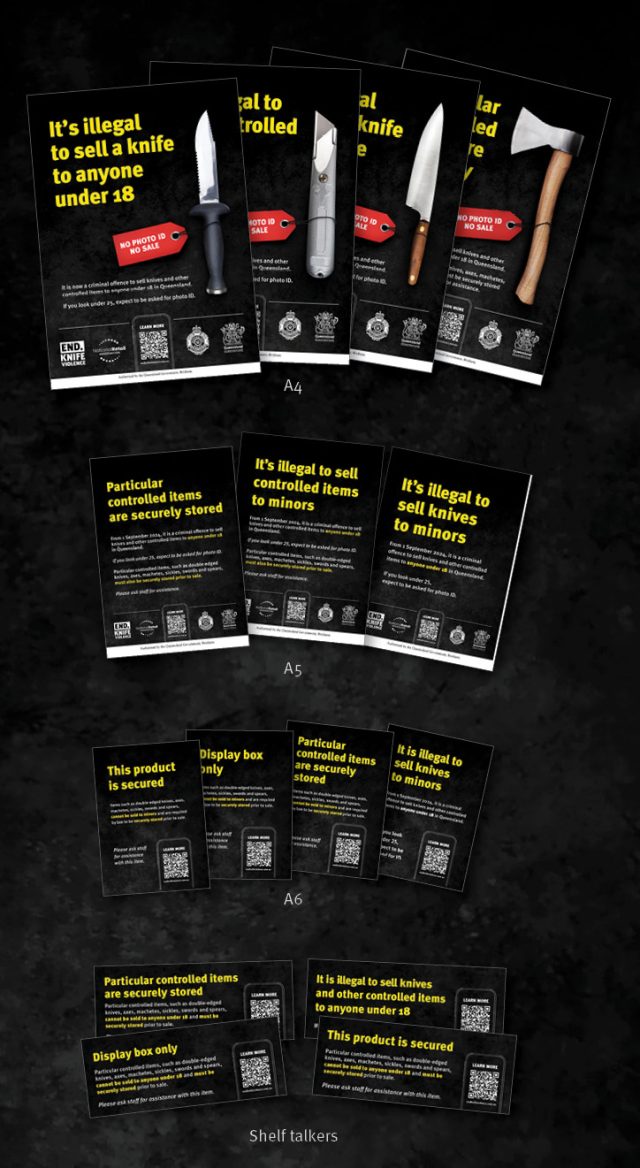
In addition to displaying signs which meet the specified requirements which will be defined in regulation, businesses may choose to display further campaign materials to help educate your customers. For example:
Queensland Police Service and National Retail have developed a range of campaign materials in various sizes which businesses can use voluntarily to supplement the mandatory signage.
IMPORTANT: The colour campaign signage is not a substitute for mandatory black-and-white signage which must follow the wording, colour, size and location requirements prescribed under regulation.
.
Employees are often responsible for serving customers and processing sales, rather than the business owner. It is vital that staff members understand their obligations and the consequences for them, the business, and the community if controlled items end up in the wrong hands.
Legal requirements for sellers:
Penalty for sellers failing to meet these requirements: maximum 40 penalty units.
TIPS
Staff instruction
It is at the discretion of the business whether to incorporate instruction about the new laws into existing training or by conducting individual or group meetings with their team.
To meet the legal requirements, your instruction of staff must include:that controlled items must not be sold to minors,
Keeping records
It is a requirement to obtain written acknowledgement from the employee that confirms they have received instructions and warning about their obligations. This could be a simple physical letter or an electronic form, as long as the business can clearly demonstrate what was instructed and that this was acknowledged by the employee.
It is recommended that businesses keep these records for a reasonable time beyond that staff member’s employment in case an incident requires investigation in future.
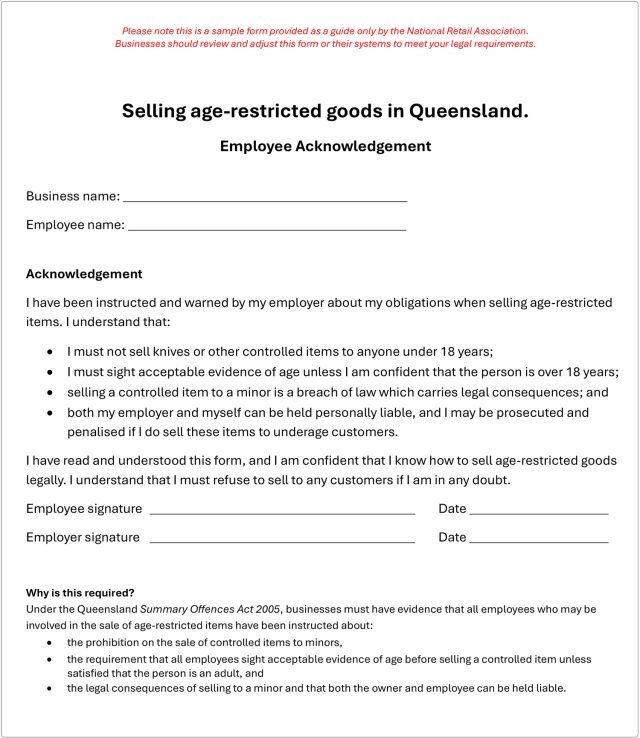
National Retail has developed a sample staff acknowledgement form for businesses to incorporate into staff training and record-keeping if you do not already have a system in place.
Scroll down or click here for resources.
.
While knives and other controlled items are primarily designed for household uses, trades, and sports, some of these products are being promoted or glamorised as weapons suitable for combat or violence.
Legal requirements for sellers:
Penalty for sellers failing to meet these requirements: maximum 25 penalty units.
Check all features of a controlled item, or the way in which the item is sold, such as:
These elements must not indicate or suggest that the item is suitable for combat, intended for violence, or be likely to encourage violent behaviour.
Requirements for most single-edged knives cease here.
Continue to Step 7 and 8 if you sell controlled or restricted items requiring secure storage.
Unfortunately, particular items, such as axes, machetes and hunting knives are increasingly being stolen and used in criminal activity to create fear, harm and even death. While most people do not use these items inappropriately, precautions are needed to prevent to prevent theft and unauthorised access, given their ability to be used a deadly weapons.
Which items must be securely stored?
Under the new legislation, particular controlled items and restricted items must be securely stored. Secure storage for single-edged knives is not mandatory.
Controlled items requiring secure storage are:
Secure storage already applies to items classified as restricted items or weapons, such as certain gel blasters and handcuffs.
See STEP 01: Assess your range for examples of Controlled-Secured items and Restricted items, as well as advice on how to determine how your item is classified.
Legal requirements for sellers: 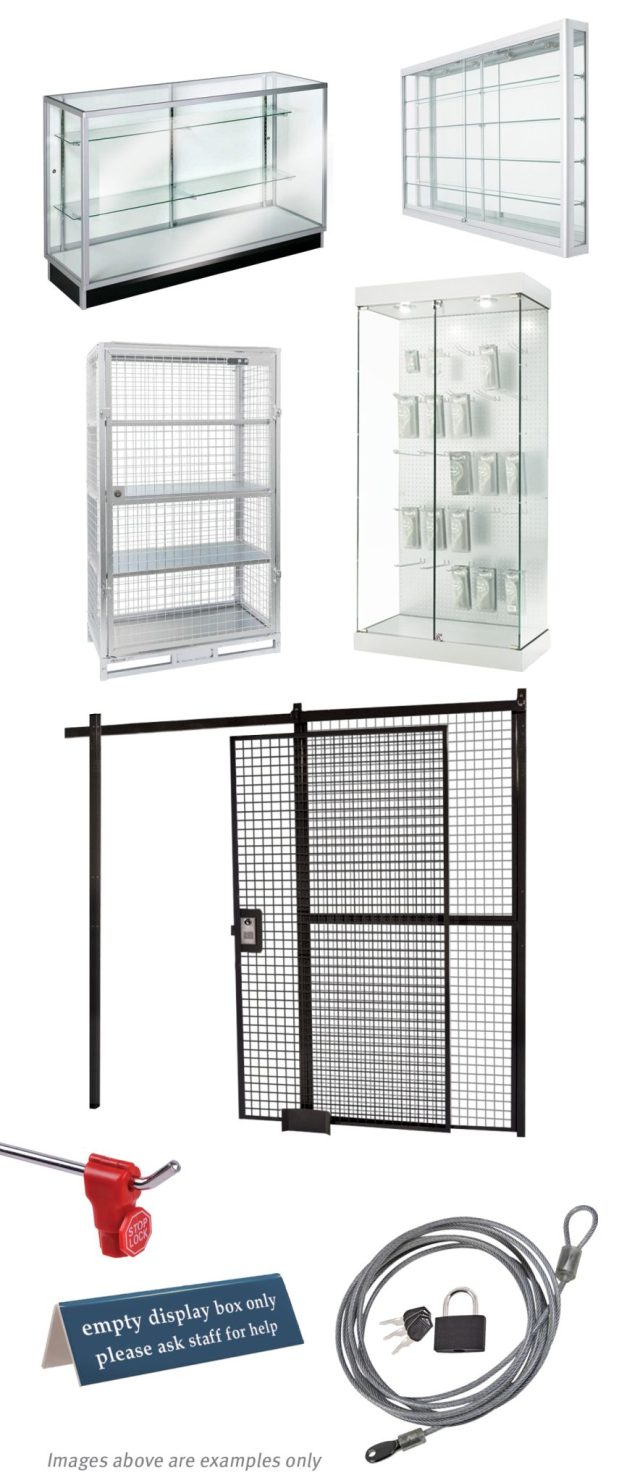
Penalty for sellers failing to meet these requirements: maximum 50 penalty units.
What is secure storage?
Business considerations
Store processes and training
Sellers need to ensure the items remain securely stored at all times, including when the stock is not on display, except when in the physical possession of a person.
The National Retail Association recommends businesses implement processes and training to ensure you can maintain security while managing the busy demands of a store. For example, you may want to consider how keys are stored and monitored, and which staff will be allowed access. You may need to look at how new, excess, returned, or damaged stock of controlled items will be securely stored at all times. We also recommend that businesses train their staff in safe opening of cages and cabinets which do not put staff at risk should thieves attempt to steal dangerous items.
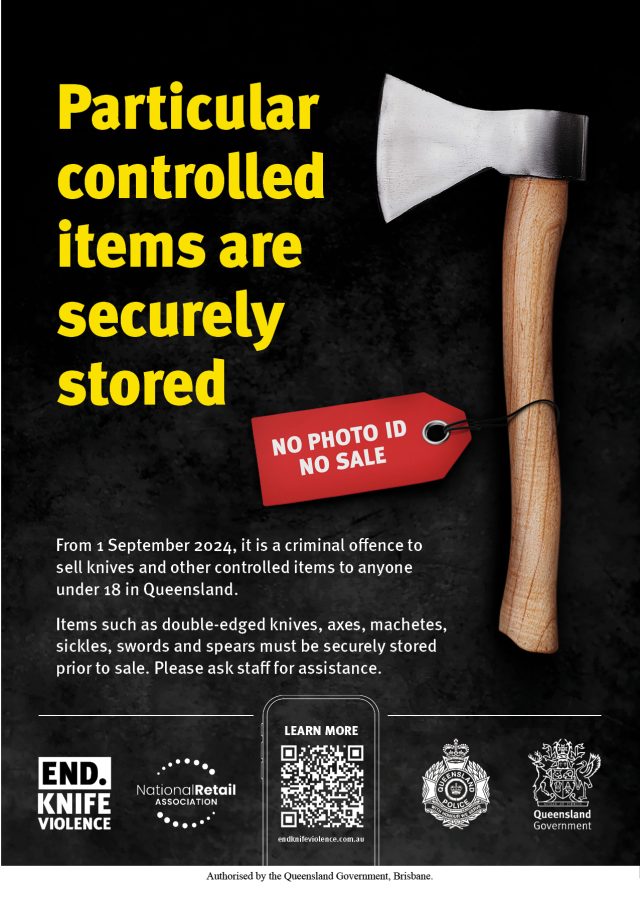
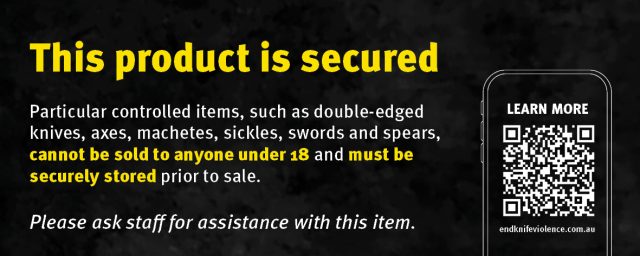
Sellers of items requiring secure storage may want to consider additional optional signage to help customers understand what they need to do in order to access secured items. National Retail has developed optional signage for businesses which advises customers of age requirements, secure storage laws, and how to ask staff members for assistance.
IMPORTANT: Campaign signage is not a substitute for mandatory signage which must follow the wording, colour, size and location requirements prescribed under regulation. See Step 04.
Scroll down or click here for resources.
Under the Weapons Act, a person must not possess or acquire a restricted item, without reasonable excuse. Restricted items include replica weapons and items that could be easily mistaken for real weapons, such as certain gel blasters.
These items have the potential to cause serious psychological harm to victims, bystanders and police, and may result in the serious physical harm or death of the offender if responding police officers believe the item to be a genuine firearm and utilise proportionate force to mitigate the perceived threat.
There are further requirements for other items considered Restricted Items. Examples include handcuffs, nunchaku, kung-fu or similar sticks, batons, laser pointers, replica firearms and inoperable weapons. Further regulations apply to items classified as weapons.
Sellers are responsible for ensuring they are aware of their obligations for all products they sell. More information on gel blasters, restricted items and weapons is available on the Queensland Police Service website.
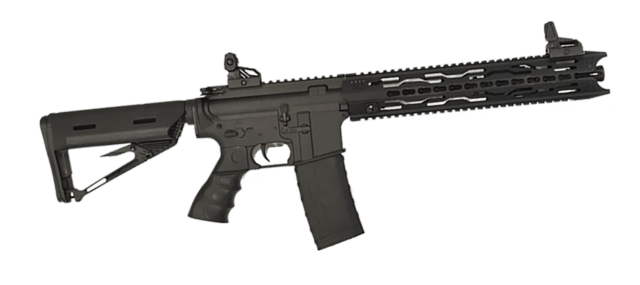
A replica firearm that is a restricted item includes life-like toy guns known as Gel Blasters (also known as a gel gun, hydro blaster, or gel ball blaster) that shoot gel pellets, if the design of the item replicates a firearm to the extent that it may be mistaken for a genuine firearm. Gel Blasters like this are a replica firearm under section 9(f) of the Weapons Category Regulation 1997 and regulated under section 67 of the Weapons Act 1990.
Legal requirements for certain gel blasters:
Applies to: Gel Blasters which may be mistaken for a firearm.
Recommendations for sellers of Gel Blasters
Applies to: Gel Blasters which may be mistaken for a firearm are prohibited from being sold to minors.
Sellers should also implement all measures described previously in this Guide for Controlled-Secured items:
A weapons licence is not required in QLD for a gel blaster.
Factsheets about the QLD laws are available in English, Arabic, Chinese (traditional), Chinese (simplified), Hindi, Korean and Vietnamese.

There are new laws which came into effect in Queensland from 1 September 2024 which mean that knives and other items are considered controlled items.
Sellers must ensure controlled items are not sold to minors under 18 years and this will require age checks, staff instruction, in-store signage, and advertising restrictions. Some knives, such as those made from plastic or with a rounded end, are exempt.
Particular controlled items, such as axes, machetes, and swords, cannot be sold to minors but must also be securely stored prior to sale, such as in locked cabinets or tethered so they cannot be removed without staff assistance.
Restricted items, such as gel blasters which could be mistaken for real firearms, cannot be sold to minors, must be securely stored, and have additional obligations for both sellers and buyers.
While the majority of knives and bladed items purchased from a store are not used in crime, some are bought or stolen and used as a weapon.
Knife-related crime poses a serious risk to community safety with increased offences reported, especially in crimes committed by minors.
Queensland’s new laws are designed to reduce the accessibility of certain items to young people, deter violent offences, support responsible retailing, and improve community safety. Restrictions on controlled items are just one part of a large suite of initiatives being implemented by the Queensland Government and the Queensland Police Service to strengthen community safety.
The laws apply to all persons, businesses and places which sell impacted items outside Queensland and/or to a person in Queensland.
This includes all retailers, such as supermarkets, hardware, sporting, outdoor, fishing, craft, discount, convenience, kitchenware and other outlets.
It also applies to members of the public or non-business organisations who sell controlled items, such as sporting groups, online sales, second-hand sales, market sellers or events.
In 2023, the Queensland Government announced their intention to strengthen knife legislation. In February 2024, the Summary Offences (Prevention of Knife Crime) and Other Legislation Amendment Bill was passed. The regulatory changes were implemented via the Summary Offences (Prevention of Knife Crime) and Other Legislation Amendment Act 2024.
Regulations came into effect from 1 September 2024. Penalties apply for non-compliance.
Yes. Underage staff can sell controlled items to people over 18.
It is not an offence for a minor to sell a controlled item to an adult, but they cannot sell to a minor.
It also not an offence for a minor to possess a controlled item if they have a reasonable excuse, or to supply a minor with a controlled items, such as supplying them with a box-cutter to open cartons during work.
No. A minor cannot buy a knife for any purpose.
Some minors, such as trade apprentices, may require knives, box-cutters or other controlled items for work purposes.
Minors are allowed to possess controlled items if they have a reasonable excuse, however they cannot purchase these items if they are under 18 years.
Adults in a business can purchase and supply controlled items to under-age employees (free or as part of other work arrangements), however they cannot sell these items to under-age employees.
It is not an offence to sell a controlled item to an adult who is accompanied by a minor. It is an offence to sell to a minor.
Sellers must take all reasonable steps to ensure they do not sell to minors, including online and delivery.
A basic pop-up screen or tick box asking ‘Are you over 18’ is unlikely to provide responsible businesses with confidence that they are not at risk of selling to a minor and breaching the law.
While a minor can also be penalised for falsely representing themselves (such as via a fake ID), a seller must be able to prove they took all reasonable steps to verify age.
You may like to consider ways to verify age through the online sale process, such as:
Consider whether you need to sell controlled items online and whether you have the capacity to perform the necessary ID checks. If you are unsure, consider phasing out these items, or limit them to physical store sales or click-and-collect.
The National Retail Association was officially engaged by the Queensland Police Service to engage and assist businesses to understand and prepare for the new laws. From May to October 2024, the National Retail team delivered a range of support services for businesses, including a tollfree hotline, factsheets and signage, online webinars, and physical visits to retailers in over 600 retail centres and precincts across Queensland.
This engagement program has now concluded.
From November 2024, non-member queries about knife laws in any state should be directed to PoliceLink 131 444.
National Retail Policy members can contact the Policy team for support: policy@nationalretail.org.au
For emergencies, call Triple Zero (OOO).
Please note that this guidance does not constitute legal advice. Businesses are encouraged to refer directly to the legislation and seek independent legal advice to ensure compliance.